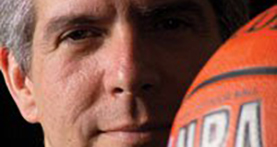 By Jeff Batt | gargoyle@flagler.edu
By Jeff Batt | gargoyle@flagler.edu
As a young man, Yvan Kelly picked up basketball nearly due to convenience. He loved it, but did not have a passion for it. He used sports as a way to socialize with neighborhood kids.
The few shots he took, however, led him to coaching, becoming an Associate Dean and eventually an NBA scout. It’s a journey that started playing on the team in high school.
“When you say play it, it depends how liberally you define play,” Kelly said. “I was on the team, but I did not get in many games.”
When he went to University of Central Florida, he earned a spot on the roster. One of his teammates, Bo Clark, is now the coach of Flagler Men’s Basketball.
“Yvan has a great mind, but most importantly is a great person. I have known Yvan for 40 years. He is one of the smartest, wisest guys I know,” Clark said.
He decided to go into coaching, starting at a Catholic grade school, while working at a sporting goods store. After getting a career teaching at UCF, Kelly was one of the rare few able to skip coaching high school and proceed onto college sports.
His career began at Westmont College in California, where he led his team to the N.A.I.A (National Association of Intercollegiate Athletics) Final Four. Kelly used his success at Westmont to eventually become a volunteer assistant coach at powerhouse Auburn University in Alabama.
“My two seasons we were 56-9, we never lost at home, were ranked #1 in the country in N.A.I.A. and went to the N.A.I.A. Final Four,” Kelly said. “Given that success, I wanted to take a chance at the Division I ranks and experience big-time college sports. When I got the chance to be on the coaching staff at Auburn, I jumped at it.”
After coaching at Auburn and, after, at a junior college, he was recruited by Clarke to become his assistant basketball coach at Flagler and teach economics.
He followed that path for five years until he received a call from a friend who worked for the L.A. Lakers. He asked Kelly if he could do some scouting for them. His response was surprisingly humble: “yeah, I think I could fit that into the schedule.”
For Kelly, scouting was a valuable experience.
“Scouting was a lot of fun and also a lot of hard work. I liked going to the different college campuses and NBA arenas. I got to meet and know lots of interesting, famous and successful people,” Kelly said. “Little of the work of scouting is glamorous. It was a long trip and a lot of work. A big part of my job was to tell the general manager who not to draft.”
After working for the Lakers for two years, he was contacted by the head scout of the Seattle Super Sonics, now the Oklahoma City Thunder, Mark Warkentine. He asked Kelly if he could do scouting in the southeastern region at schools like University of Florida and Florida State University.
In his first year as a scout for the Sonics, he scouted 35 games and every year the amount of games continued to grow from 45 to 50 to 70 and even 80 games in a season, while he was continuing to teach economics at Flagler.
Kelly was able to do two types of scouting; the first was typical scouting where a scout searches for raw talent for the annual NBA Draft and notifies teams who to look out for. The other kind was advanced scouting.
“You would see another NBA team and get their play calls, send the scouting report to the coaches, which would get incorporated into the game plan,” Kelly said.
Even though he did not have to travel around the country, Kelly still had to deal with a tight schedule,
“I would teach all day, drive to FSU to see an ACC game and drive back that night, teach class that next day and write about what I saw the night before,” Kelly said.
As a scout, his job was complex. He watched for players’ speed, strength, leaping ability, reaction to a bad foul, position projection and passing ability.
Part of the experience was running into scouts from other teams that he would see at other events. Even though they would compete to gather information about the same players, it was not always about that.
“I looked forward to seeing people on the road. The scouting circle is small. We call it a heard. We all got to know about our families and each other,” Kelly said.
Eventually, the time arrived where he knew he would not have time for scouting anymore.
“The road takes its toll, especially when you’re going to 80 games a year and there are no home games in that schedule,” Kelly said.
But Kelly hasn’t quit scouting altogether. He currently works for the Houston Rockets part-time and scouts for one to two games per month. He credits basketball with being a fundamental force in his life.
“Basketball has been a very rewarding element in my life,” Kelly said. “From the places I travelled to the people I worked with to the experiences I had, I am a very fortunate person. I’m sure there are a lot of people who would have gladly traded places with me. I’m very thankful for my experiences.”




Be the first to comment on "Associate Dean has a rich scouting past"